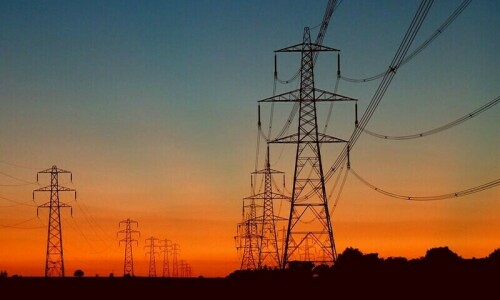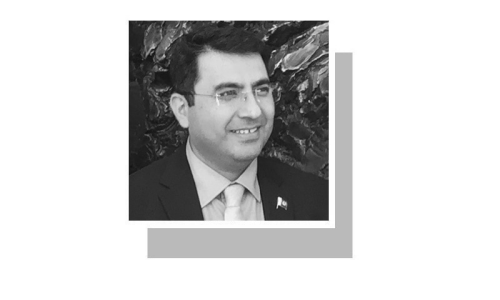LET me start with a disclaimer. I will not venture an opinion in this article on whether the proposed amendments to the State Bank Act are good or bad. I will simply lay out what is happening here and let the readers decide for themselves whether it is good or bad.
It is a principle in the world of sovereign lending that those prerogatives a ruler cannot manage or handle are eventually taken out of the ruler’s hands. What the amendments to the State Bank Act, as well as the Nepra Act, aim to do is take key powers out of the hands of the government, mainly because the government has — over the years — demonstrated an inability to wield these powers in any productive way. In fact, successive governments have used these powers to try and compensate for their shortcomings in other areas.
In the case of the power sector these shortcomings are primarily reflected in the mounting circular debt, which is the result of many failures not just the rising cost of power. And in the case of the State Bank, these shortcomings are the failure to undertake meaningful tax reform and the erosion of the country’s competitiveness in global markets.
In response to this persistent failure, Pakistan’s creditors are now telling the government to surrender the power to notify tariffs and vest it in the hands of the regulator. The idea is to arrest the continuously rising circular debt. In addition, they are also saying that the power to print money or determine the price of money (interest rates and exchange rate) — that belongs to the State Bank — should also be surrendered. The idea is to prevent recourse to printing of money to pay government bills or provide support to the private sector, as well as rig the exchange rate to compensate for growing import dependence and eroding export competitiveness.
It is a principle of sovereign lending that those prerogatives a ruler cannot manage are eventually taken out of the ruler’s hands.
In the power sector they are bringing in what they call the ‘principle of automaticity’ whereby power tariffs will be automatically adjusted by the regulator — Nepra — to cover any shortfalls in recoveries and to avoid the damaging effects of ‘delayed notification’ by the government. The process will begin with two massive power tariff hikes in June and July this year, followed by another in July next year. After that, it’s all up to the regulator.
The amendments to the State Bank Act go a few steps further. Not only will the government be removed from the process that decides the price of money — interest rates and the exchange rate — but the State Bank will also be prohibited by law to lend directly to government (a process tantamount to printing money to pay the government’s bills) as well as operate refinancing facilities to support the private sector directly for any purpose other than fighting inflation.
A glance at the past is necessary to grasp the full impact of this. When Pakistan entered an IMF programme in November 2008, in the thick heat of the great financial crisis, it was printing money to pay for its rising deficit, equal to 7.4pc of GDP at the time, a mammoth amount. The IMF required that this printing of money should stop altogether and the outstanding stock of government borrowing from the State Bank be brought down. These caps on borrowing from the bank remained in place throughout the programme period, but the government resorted to it again after 2016, when it left its second IMF programme.
But the government had another way to use State Bank financing (meaning printing money) to compensate the private sector for the losses that it was being burdened with under the ongoing adjustment. In December 2007, the State Bank announced what it called the Long-Term Financing Facility to extend cheap credit to exporters to buy plant and machinery. A few years later, this was followed up with another such financing facility designed to provide cheap credit to affectees of the floods, also as a temporary measure.
Such facilities have mushroomed over the decade since then and it is hard to get an exact tally of how many are now operating, and the amounts disbursed through them have multiplied into hundreds of billions of rupees. More recently, the government introduced another such facility, calling it the Temporary Economic Refinance Facility and gave Covid as the reason. TERF was designed to provide cheap credit for purchase of plant and machinery as well, though not exclusively for exporters. In one year, the amount approved under TERF alone has touched Rs430bn.
Today, the IMF is demanding that the government strip the State Bank of the power to operate such facilities. All these facilities were issued under Section 17 of the State Bank Act, and the proposed amendments seek to delete this section altogether. State Bank data shows that up till February of this year, loans extended to industry through these schemes were more than 15 per cent of the total outstanding loans, a very large percentage that will no longer be available going forward.
Returning to the question of whether this is good or bad, I will only say it is inevitable in a situation where the government has not brought any reform agenda of its own to the table when negotiating with its creditors. Refinance schemes of this sort are not necessarily bad, so long as care is taken to ensure the funds are used for the purpose for which they are intended and the benefits are not being skimmed by the banks. There is no necessary reason why this power should be surrendered at the behest of the creditors.
But so long as the government fails to get a handle on its governance responsibilities and remains on a borrowing binge to pay for its shortcomings, the bills for its failures will mount. At some point, the creditors will act since their interests are threatened with the rising burden of these bills. And when creditors act, borrowers have to surrender some of their prerogatives. That is where we stand today.
The writer is a business and economy journalist.
Published in Dawn, March 25th, 2021













































